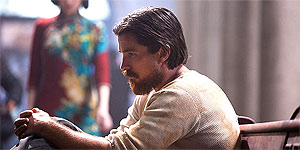- Home >
- Cinema & Film >
- The Flowers of War Film Review
The Flowers of War (15)


Director
Yimou Zhang
Yimou Zhang






Review byMatthew Turner03/08/2012
Three out of Five stars
Running time: 146 mins
Impressively directed and beautifully shot, this is a compelling, superbly acted drama that exerts a powerful emotional grip, though it's impossible not to suspect that certain liberties have been taken with the actual events.
What's it all about?
Directed by Zhang Yimou, The Flowers of War (Jin líng shí san chai, original title fans) opens in 1937 Nanking as the Japanese army are finishing up their brutal invasion. Christian Bale stars as American mortician John Miller, who arrives at Nanking's Winchester Cathedral in order to bury its priest, only to find that the body has been completely vaporised by a bomb.
The church's only surviving male is altar boy George Chen (Huang Tianyuan), who begs John to stay and help him protect a group of twelve orphaned pre-teen girls from the marauding Japanese army. After a brutal attack by the soldiers, John agrees to help and disguises himself as a priest in order to fool the authorities. However, as if that wasn't bad enough, a group of prostitutes also arrive seeking refuge and John realises he has to try and find a way for them all to get out of Nanking.
The Good
Christian Bale is superb as Miller and his transition from drunken bystander to reluctant hero is well handled. He has strong chemistry with Ni Ni (as Yu Mo, the beautiful leader of the prostitutes) and there's terrific support from both Huang Tianyuan and from Zhang Xinyi as Shu, one of the girls, who narrates the story from her own perspective.
The film is beautifully shot throughout, courtesy of cinematographer Xiaoding Zhao and the film contains some extraordinary images, such as an explosion in the ruins of a paper shop that sends bright flashes of colour fluttering into the air. In addition, Zhao and Zhang evoke a series of complex emotional reactions by finding stunningly beautiful images amidst scenes of horrific tragedy.
The Bad
The only real problem with the film is that the script occasionally errs on the side of emotionally manipulative melodrama, to the point where you're wondering just how much of the original story is actually left. Similarly, the device of having the story unfold from Shu's perspective robs the film of a potentially powerfully emotional climax and it's not hard to imagine how a different director might have handled the same material. There's also the occasional directorial misfire, such as fantasy musical sequence that seems out of place and is badly staged.
Worth seeing?
This is a beautifully shot, emotionally gripping drama with a terrific central performance from Christian Bale. Worth seeing.
Running time: 146 mins
Impressively directed and beautifully shot, this is a compelling, superbly acted drama that exerts a powerful emotional grip, though it's impossible not to suspect that certain liberties have been taken with the actual events.
What's it all about?
Directed by Zhang Yimou, The Flowers of War (Jin líng shí san chai, original title fans) opens in 1937 Nanking as the Japanese army are finishing up their brutal invasion. Christian Bale stars as American mortician John Miller, who arrives at Nanking's Winchester Cathedral in order to bury its priest, only to find that the body has been completely vaporised by a bomb.
The church's only surviving male is altar boy George Chen (Huang Tianyuan), who begs John to stay and help him protect a group of twelve orphaned pre-teen girls from the marauding Japanese army. After a brutal attack by the soldiers, John agrees to help and disguises himself as a priest in order to fool the authorities. However, as if that wasn't bad enough, a group of prostitutes also arrive seeking refuge and John realises he has to try and find a way for them all to get out of Nanking.
The Good
Christian Bale is superb as Miller and his transition from drunken bystander to reluctant hero is well handled. He has strong chemistry with Ni Ni (as Yu Mo, the beautiful leader of the prostitutes) and there's terrific support from both Huang Tianyuan and from Zhang Xinyi as Shu, one of the girls, who narrates the story from her own perspective.
The film is beautifully shot throughout, courtesy of cinematographer Xiaoding Zhao and the film contains some extraordinary images, such as an explosion in the ruins of a paper shop that sends bright flashes of colour fluttering into the air. In addition, Zhao and Zhang evoke a series of complex emotional reactions by finding stunningly beautiful images amidst scenes of horrific tragedy.
The Bad
The only real problem with the film is that the script occasionally errs on the side of emotionally manipulative melodrama, to the point where you're wondering just how much of the original story is actually left. Similarly, the device of having the story unfold from Shu's perspective robs the film of a potentially powerfully emotional climax and it's not hard to imagine how a different director might have handled the same material. There's also the occasional directorial misfire, such as fantasy musical sequence that seems out of place and is badly staged.
Worth seeing?
This is a beautifully shot, emotionally gripping drama with a terrific central performance from Christian Bale. Worth seeing.
Be the first to review The Flowers of War...
Film Blog
Man of Steel Film Trailer
This week Matthew Turner gives us his thoughts on the Man of Steel film trailer, the Wild Bill DVD release and all the latest film releases.
Film of the Week
Searching for Sugarman
A documentary charting the search for a musician and his influence after his disappearance from the limelight.
Latest Close Up
William Friedkin Interview
The director behind Killer Joe talks about working with Matthew McConaughey and the notorious fried chicken scene.










